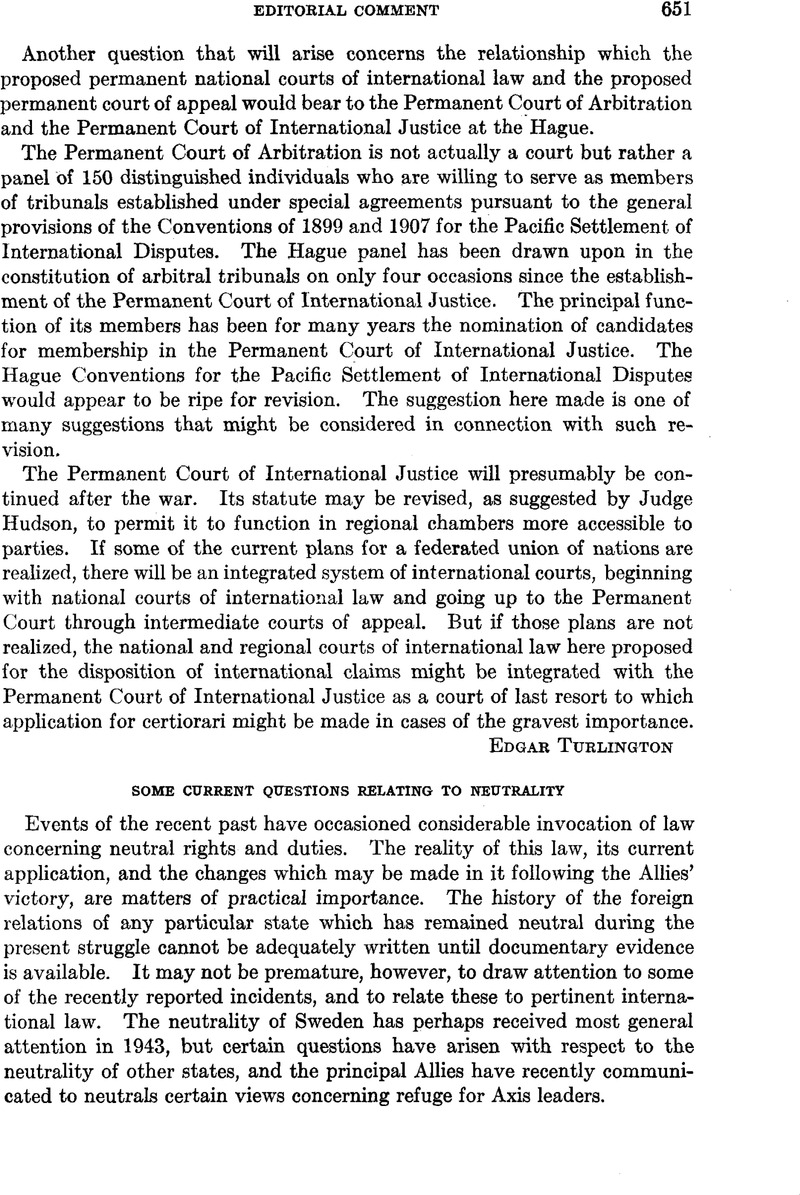No CrossRef data available.
Published online by Cambridge University Press: 12 April 2017

1 The charges were that Sweden had violated Hague Convention V of 1907 in the matter of recruiting and the forming of units under command of Swedish army officers, in permitting the repair of German war machines in Swedish factories, in refusing to intern crews of German military aircraft which had landed in Sweden, in permitting Germans, to use Swedish territorial waters and in convoying German transports, in allowing southern Swedish ports to be converted into German bases, and in assuming fictitious ownership of several Finnish ships and permitting them to fly the Swedish flag. The New York Times, June 6, 1943, p. 14, summarizing the charges of Professor Sergei Kryloff in the publication War and the Working Class. The charges were supported by figures on the number of carloads of German munitions that had moved on Swedish railroads.
2 The New York Times, June 11, 1943, p. 3. The Swedish spokesman claimed, according to report, that the transport of food and ammunition was in accordance with Hague Convention V.
On the general subject see also Naboth Hedin, “Sweden: the Dilemma of a Neutral,” in Foreign Policy Association Reports, Vol. XIX, No. 5 (May 15, 1943), pp. 52–53.
3 Ibid., July 6, 1943, p. 10. According to report, it was said unofficially for the Swedish Government that it had made no agreement for the return of deserters in uniform or otherwise.
4 Manchester Guardian Weekly, Aug. 13, 1943, p. 86 (reproducing statement from the Dagens Nyheter).
5 The New York Times, Aug. 29, 1943, p. 9. The sinkings were not the first reported to have been perpetrated by the Germans. On April 16 the Swedish submarine Ulven had been sunk, allegedly by a German mine. Also reported were attacks inside Swedish territorial waters upon a Swedish submarine, a torpedo boat and an aircraft.
6 Ibid., Aug. 31, 1943, p. 3. Swedish newspapers are reported to have labelled the spying charges as brazen and inexplicable.
7 Ibid., April 19, 1943, p. 8; May 1, 1943, p. 8; May 7, 1943, p. 5. A public statement of the Turkish Prime Minister concerning his country’s relations with Russia, Great Britain, and Germany, respectively (but which does not deal with repatriation of airmen) is quoted in The Times (London), June 16, 1943, p. 3.
8 Manchester Guardian Weekly, July 30, 1943, p. 67.
9 The New York Times, Sept. 3, 1943, p. 2.
10 Ibid., June 6, 1943, p. 25.
11 Ibid., Sept. 3, 1943, p. 2.
12 The Baltimore Sun, June 28, 1943, p. 2. Correspondence between the United States and Argentina (Department of State Bulletin, September 11, 1943, p. 159) appeared too late for discussion here.
13 The New York Times, Sept. 3, 1943, pp. 1, 5.
14 United States Department of State, Bulletin, July 31, 1943, p. 62.
15 Idem.
16 The New York Times, Aug. 4, 1943, p. 5.
17 Ibid., Aug. 5, 1943, p. 5.
18 Statements in the Gazette de Lausanne, the Winterthur Tagblatt, and the Easier National Zeitung, as quoted in the Manchester Guardian Weekly, Aug. 13, 1943, p. 86.
19 Cf. Lauterpacht, H., “Neutrality and Collective Security,” in Politica, Vol. II (1936), pp. 133–155 Google Scholar.
20 The New York Times, Aug. 30, 1943, p. 1 (George Axelsson’s dispatch from Stockholm).
21 Wilson, R. R., “Non-Belligerency in Relation to the Terminology of Neutrality,” in this Journal, Vol. 35 (1941) pp. 121–123 Google Scholar.